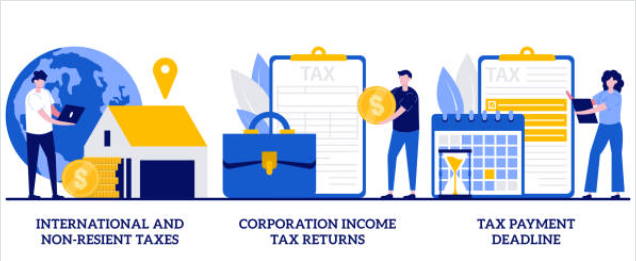For many Non-Resident Indians (NRIs), managing taxes across two countries is more than just a paperwork hassle—it’s a financial tightrope. With income sources spread across borders, one of the most pressing challenges is double taxation: getting taxed in both India and your country of residence on the same earnings.

But here’s the good news: India’s tax laws, along with its network of Double Taxation Avoidance Agreements (DTAAs), provide structured relief—if you know how to navigate them correctly.
In this comprehensive tax filing guide for NRIs, we explain:
1. How India’s Income Tax Act treats global and Indian income for NRIs
2. The role and benefits of DTAAs
3. Smart strategies to avoid double taxation legally
4. Key documentation and filing tips that can save you money and prevent compliance issues
Whether you’re earning rent from property in India, capital gains on investments, or interest on NRO accounts, this guide will help you stay tax-efficient, compliant, and stress-free.
Who Is Considered an NRI for Tax Purposes?
Before diving into the tax implications, it’s essential to confirm your residential status under Indian tax laws. As per the Income Tax Act, 1961, an individual is considered a Non-Resident Indian (NRI) if:
1. You were present in India for less than 182 days during the financial year, or
2. You were not in India for 60 days or more in that year and 365 days or more in the past four years.
This status determines how your global income is taxed in India. Only income earned or received in India is taxable for NRIs.
What Is Double Taxation?
Double taxation occurs when the same income is taxed in more than one country. For instance, if you earn rental income from a property in India but also report it in your country of residence, you may end up paying tax on it twice—once in India and once abroad.
This is where Double Taxation Avoidance Agreements (DTAAs) play a crucial role.
How DTAAs Help NRIs Avoid Double Taxation
India has signed DTAA treaties with over 90 countries, including the USA, UK, UAE, Canada, Australia, and more. These treaties offer relief from double taxation through two primary methods:
1. Exemption Method
This method ensures that the income is taxed in just one country. For example, if your country of residence exempts income already taxed in India, you won’t be taxed again on that income abroad.
2. Tax Credit Method
In this case, the income is taxed in both countries; however, the tax paid in India can be claimed as a credit in your country of residence, helping to lower your total tax burden.
To claim DTAA benefits, NRIs must file the following:
– Form 10F
– Tax Residency Certificate (TRC) from their country of residence
– A self-declaration under applicable DTAA provisions
Which NRI Incomes Are Taxable in India?
Here’s a brief summary of the types of income that are taxable in India for NRIs:
| Income Type | Taxable in India? |
| Salary received in India | Yes |
| Salary paid abroad for services in India | Yes |
| Rental income from property in India | Yes |
| Capital gains on Indian assets | Yes |
| Interest on NRO account | Yes |
| Interest on NRE/FCNR accounts | No (if compliant with FEMA) |
| Dividend from Indian companies | Yes |
| Gifts above ₹50,000 (non-relatives) | Yes |
Note: Income earned and received outside India is not taxable for NRIs.
Effective Strategies to Prevent Double Taxation for NRIs

1. Determine Your Residential Status Each Year
Even minor changes in days spent in India can alter your tax status. Use official guidelines to confirm if you’re an NRI, RNOR, or Resident, as this affects taxability.
2. Use DTAA Benefits Wisely
Identify the DTAA provisions that apply to your income type. For example, the India-US DTAA has specific rules for dividends, capital gains, and retirement income.
3. Separate NRE and NRO Accounts
Use NRO accounts only for income earned in India. Interest on these accounts is taxable. For foreign income, stick to NRE/FCNR accounts, which are exempt if FEMA-compliant.
Also explore: Accounting and Bookkeeping Services for NRIs
4. Submit TRC and Form 10F to Claim Relief
Get a Tax Residency Certificate from your country and submit Form 10F along with a DTAA declaration. Without this, tax authorities may deny DTAA relief.
5. File Your ITR in India on Time
Even if your taxable income is below the threshold, filing an Income Tax Return (ITR) in India ensures proper documentation for refunds and DTAA claims. Filing early can help you avoid scrutiny.
Recommended reading: Top Benefits of Filing ITR Early (Beyond Just Avoiding Penalties)
Common Mistakes NRIs Should Avoid
– Using a resident bank account instead of converting it to NRO/NRE
– Failing to declare Indian income in the tax return of the home country
– Ignoring tax on capital gains from Indian shares or property
– Not updating the residential status with financial institutions
– Missing the ITR filing deadline, which can invite penalties and notices
Documents NRIs Need to File Taxes in India
– PAN Card
– Passport (for proof of NRI status)
– Details of Indian income (rents, capital gains, dividends, etc.)
– Bank statements (NRE/NRO)
– TRC and Form 10F for DTAA relief
– Foreign Tax Return (if claiming credit)
Need help with cross-border compliance? Check out our Audit & Assurance Services.
Why Professional Help Matters for NRI Tax Filing
With tax laws constantly evolving and notices becoming more frequent, expert assistance can help you:
– Optimize taxes through DTAA planning
– Avoid common pitfalls and documentation errors
– Respond correctly to Income Tax notices or reassessment
– Ensure timely and correct ITR filing with all required disclosures
At PGA & Co.(PGACA), we specialize in offering end-to-end tax solutions for NRIs, including:
– ITR filing with DTAA claims
– Advisory on repatriation and FEMA compliance
– Capital gains tax calculation on property or share sale
– Representation in case of scrutiny or tax notices
Conclusion: File Smart, File Right
Avoiding double taxation isn’t just about minimizing tax—it’s about safeguarding your global financial well-being. For NRIs, with income streams across countries, the risk of being taxed twice is real—but entirely avoidable with the right guidance.
Whether you’re earning rental income from property in India, making capital gains on investments, receiving interest or dividends, or selling inherited assets, every financial move has tax implications that require expert handling. With the right application of DTAA benefits, accurate disclosure, and strategic filing, you can ensure that you’re not overpaying—or violating—Indian tax laws.
At PGA & Co.(PGACA), we specialize in helping NRIs simplify cross-border tax compliance. From NRI income tax filing to capital gains advisory, DTAA consultation, and repatriation assistance, we provide end-to-end support backed by expertise and experience.
Need help filing your NRI tax return or planning your taxes better?
Get in touch with our team for a personalized consultation and let us help you stay compliant, tax-efficient, and stress-free—no matter where you live.